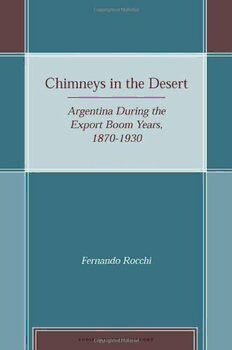
Chimneys in the Desert: Industrialization in Argentina During the Export Boom Years, 1870-1930 PDF
417 Pages·1.11 MB·English
Most books are stored in the elastic cloud where traffic is expensive. For this reason, we have a limit on daily download.
Preview Chimneys in the Desert: Industrialization in Argentina During the Export Boom Years, 1870-1930
Description:
This book offers new topics and new perspectives on the economic history of Argentina before the 1930 Depression. It focuses on the evolution of early industrialization in a country primarily associated with cattle-ranching and agriculture, and single-mindedly characterized as a case of a successful export economy. Taking an original approach, the book cross-examines traditional economic issues such as production and finances, and new cultural patterns, such as consumption, the role of women, paternalism, and ideology.The first years of Argentina’s industrialization, from the 1870s to the 1920s, coincided with a time of great innovation, a brisk turn from tradition, and quick modernization. This book shows that industry not only helped Argentina’s economy along, but spearheaded its modernization. It challenges the long-lasting “canonical version” that industry was a victim of a capital market and a state extremely hostile to manufacturing. Access to financing for industrial endeavors was much easier than previously thought, while the state supported industry through tariffs.
See more
The list of books you might like
Most books are stored in the elastic cloud where traffic is expensive. For this reason, we have a limit on daily download.
